One played the last 20 minutes of it crying relentlessly.How did one man continue after dislocating his shoulder? Let’s explore the Quirky stories from FIFA World Cup finals.
1930 :
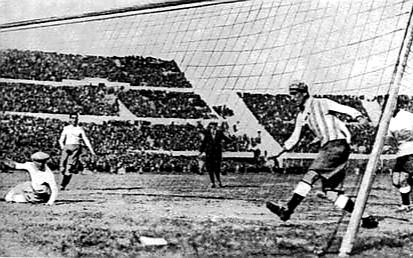
Argentina and Uruguay, it had been agreed pre-tournament, would play matches with their own balls. Then they both reached the final and all hell broke loose. “The extraordinary hatred between the two countries was revealed when the time came to choose a ball,” recalled Belgian referee John Langenus, who officiated in a shirt, tie, blazer and knickerbockers. “Both teams demanded to play with their own ball.” FIFA president Jules Rimet was forced to intervene, stipulating they would use their own ball for a half apiece. It apparently made a difference. Argentina, using a ball they imported from Scotland, were 2-1 up at half-time. Uruguay, using one they bought from England, rallied thereafter, with Hector Castro, who was known as ‘El Manco’ (‘The One-Armed One’) after accidentally cutting off his own limb with an electric saw, sealing a 4-2 victory.
1950:
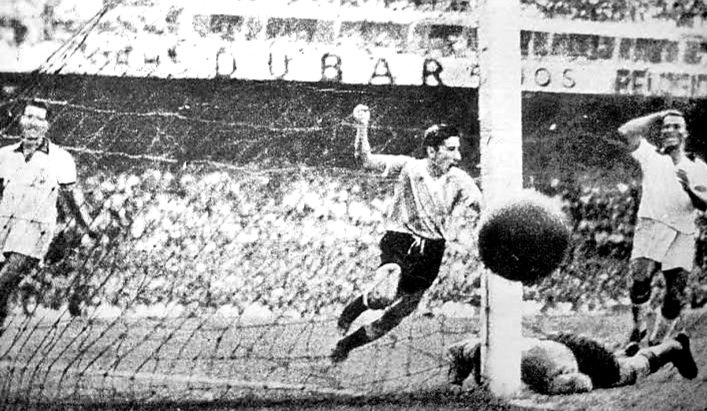
O Mundo newspaper, on the day of the decider inside the temple they had just built for it, had a photo of the Brazil line-up on its cover beneath the headline, Here Are The World Champions. Obdulio Varela, the cantankerous Uruguay captain, was enraged. He duly bought 20 copies, scattered them across the across the toilet floor of the hotel in which they were staying, and wrote ‘Trample and urinate on these newspapers’ in chalk on the mirrors. Varela then ordered his team-mates to pay a visit to the lavatory and follow his instructions. Brazil only required a draw at the Maracana and duly led 1-0, but the overwhelming outsiders, inspirited by their roaring skipper, came back to win 2-1 and lift the trophy. Uruguayans had urinated on Brazilian newspapers and Brazilian dreams in the same day. Varela, ignoring strict warning against it, then elected to go to a Rio bar on his own. “I ordered a drink and was hoping no-one would recognise me,” he said later. “I thought if they did, they would kill me. But to my surprise, despite being devastated, they congratulated me and had drinks with me.”
1954 :
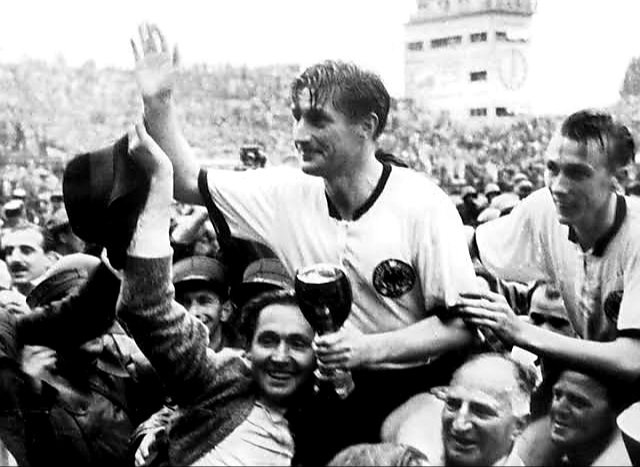
Herbert Zimmermann had accepted his fate. His day at the office would involve describing, to millions of listeners on West German radio, one Hungarian goal after another. The Magical Magyars had, after all, demolished Die Mannschaft 8-3 in the group stage and were on a world-record 30-game unbeaten run. Eight minutes in and Zimmermann had already narrated two Hungary goals. He later recalled “hoping we could keep the score down”, but West Germany battled back to equalise and then, in the 84th minute, the ball fell to Helmut Rahn. “Rahn shoots! Goal! Goal! Goal! Goal!” Zimmermann exclaimed, before going deathly silent as he tried to take in the enormity of what had happened. After eight seconds of silence – people across West Germany were frantically checking to see if they had been disconnected – Zimmermann finally regained his composure and bellowed: “Goal for Germany! Germany lead 3-2. Call me mad, call me crazy!” Kicker, La Gazzetta dello Sport and The Guardian ranked it as the most iconic piece of football commentary in history.
1970:

Tostao incredibly played the last 20 minutes against Italy crying relentlessly. The balletic playmaker turned makeshift No9 had suffered a detached retina on the cusp of the tournament, and was told his career was over. It would be – effectively at the age of just 26 – but not before, following emergency surgery in Houston, Texas and Pele urging Mario Zagallo to include Tostao in his squad, an Azteca zenith. “After the third goal, the goal that put it out of Italy’s reach, I was overwhelmed by emotion,” Tostao told FIFA+. “I started crying and I couldn’t stop. I was thinking about everything I’d been through to get to that World Cup, how close I was to missing out on it. “I travelled across the world for surgery on my eye. I was so close to not being allowed to go and almost didn’t get called up. It was really difficult to get used to playing again. When I realised we were going to be world champions, I couldn’t stop crying.” He would leave the turf in just his underpants – “They even tried to pull them off me,” he said – but with a World Cup winner’s medal, which he duly gave to the ophthalmologist who performed surgery on his eye.
1986 :
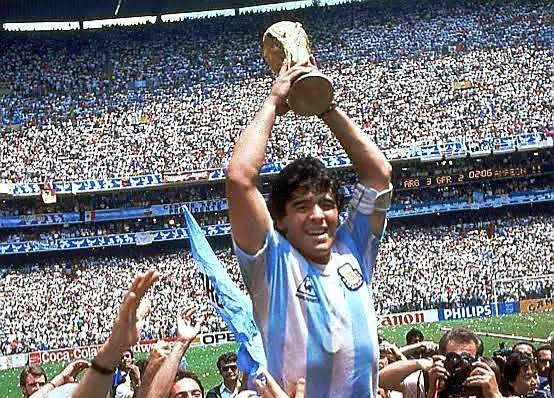
Disaster struck Jose Luis Brown, who had thrown Diego Maradona to the floor to head home the opener against West Germany, when he dislocated his shoulder just after half-time. Gave over. Or so you’d think. “The pain was unbearable,” explained ‘El Tata’, “but I told the doctor in no uncertain terms, ‘Don’t even think about taking me off.’ I bit a hole in my jersey, put my finger through it, and used it as a sling,” Brown was, unbelievably, only off the pitch for 28 seconds and played the remainder of the game as Argentina won 3-2. Brehme
remains the only player to have incredibly scored penalties with both feet in the World Cup.
1990:
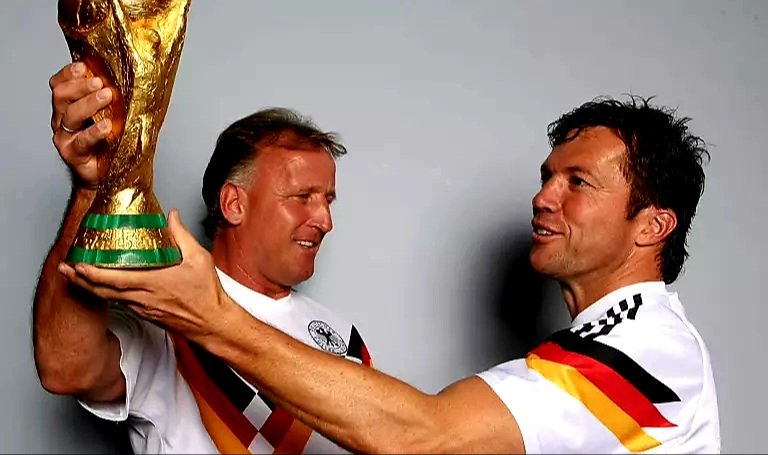
Lothar Matthaus clinically dispatched the only goal from the spot against Czechoslovakia in the semi-finals. Yet when West Germany were awarded another penalty, 85 minutes into a goalless final, Andreas Brehme curiously stepped up. “I cracked the sole in my boot in the first half,” explained Matthaus. “I didn’t have any spares, so I just had to use the only spare pair the kitman had. They didn’t fit properly and I liked worn-in boots anyway. “When we got the penalty, I told Andi to take it. We had other options, outstanding penalty takers, but Andi was my room-mate and I knew he was the right man.” Brehme, who had netted a penalty with his left foot in the shootout victory over Mexico in the 1986 quarter-finals, struck home the only goal with his right to clinch West Germany the trophy. He remains the only player in World Cup history to have scored penalties with his right and left feet. Curiously, against Yugoslavia earlier at Italia ’90, Matthaus had become the only player to ever score from outside the box in a World Cup game with both his right foot and his left.
1994:
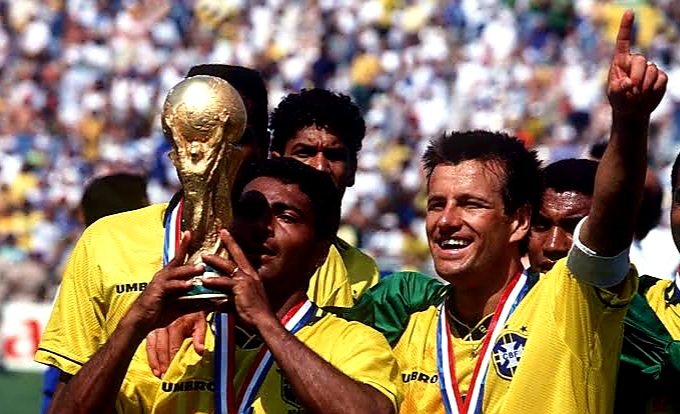
Brazil hadn’t won the World Cup in 24 years. The players were, several of them would confess, drenched with jitters. The players were holding hands, having just prayed, when defender Ricardo Rocha tried to rally the troops. “We’ve fought hard, we’ve reached this point – let’s do the same as those Japanese, the Kawasakis,” he bellowed, confusing the Kamikazes, the iconic World War II pilots, with the motorcycle manufacturers! “Nobody could stop laughing,” remembered Taffarel. “It changed the mood instantly. It totally relaxed us.” Brazil then went out and overcame Italy on penalties.


 Bengali
Bengali